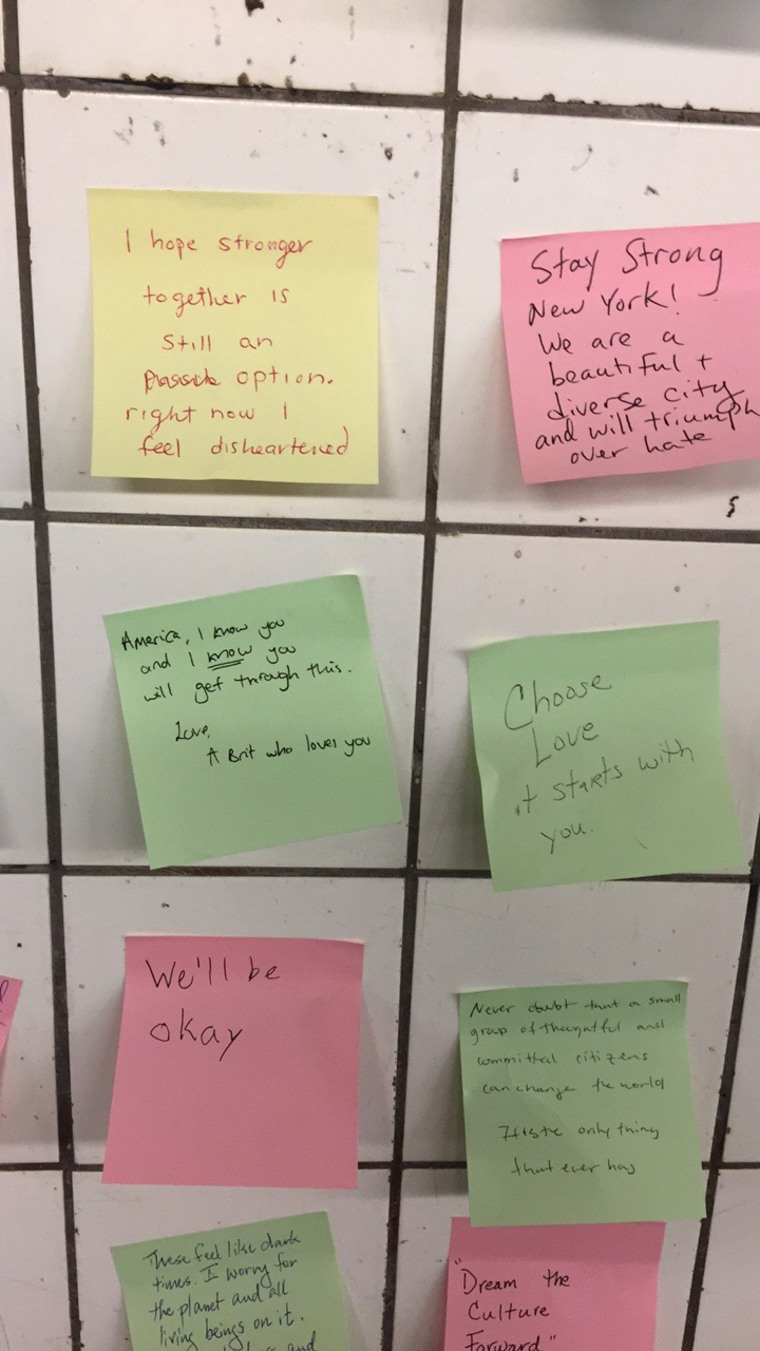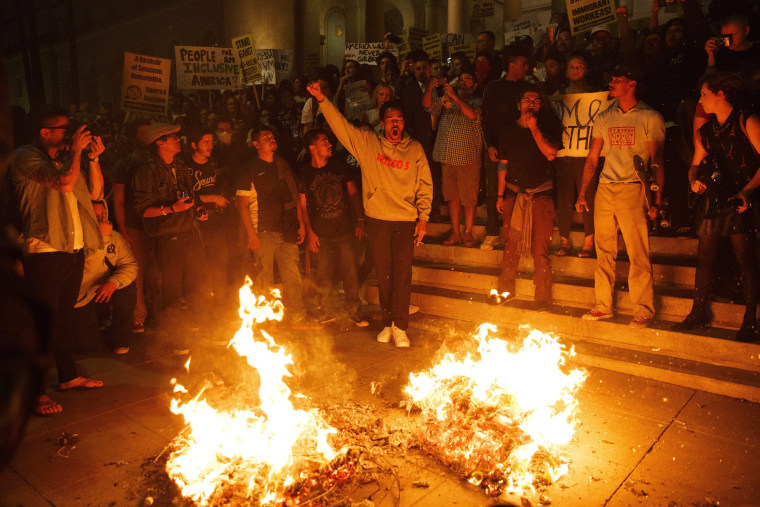Thousands of protesters swarmed the streets of several major cities Wednesday to voice their opposition to the election of Donald Trump to the White House.
Nearly 2,000 protesters gathered in downtown Chicago chanting "Not my president" and "F*** Trump" outside Trump International Hotel & Tower. Police said they arrested five people mostly for obstructing traffic and criminal trespass.
"He's said a lot, but without a track record, it's unclear what he will actually do."
"I'm here today because I'm speechless at what happened," Rebecca Gomez, 22, told NBC News. "I'm Mexican, but I was born in the United States. I'm afraid people won't care about that, though. I'm afraid they will be violent."
In New York, thousands of protesters could be heard chanting and banging drums as they marched past Rockefeller Center up Sixth Avenue, barely even acknowledging the rain.
"It's horrible that we have to do this," said Trevor Wheeler, 18, of North Dakota, who now lives in New York City. "I identify as a queer person. I will most likely lose my right to get married ... I will not be able to present myself the way I want to."
Some chanted "Racist, sexist, anti-gay! Donald Trump must go away!" and "F*** your wall!"
At least 65 people were arrested, NBC New York reported, quoting police. Most of the arrests appeared to be for disorderly conduct.
Protests also took place in many other cities Wednesday:
- More than 100 people shut down a major highway through downtown Los Angeles Wednesday night NBC Los Angeles reported. As of midnight local time (3 a.m. ET Thursday), 13 people were arrested.
- Police said more than 7,000 people mobilized in Oakland, California, where tear gas and flash-bang grenades were deployed. Bottles, rocks and firecrackers were thrown at officers, reported NBC Bay Area. Thirty people were arrested on charges including vandalism and unlawful assembly, and three officers were hurt.
A crowd that police estimated at several thousand marched Wednesday night through downtown Seattle chanting "not my president" and carrying signs reading "Fight Racism" and "Impeach Drumpy," NBC station KING reported.
- Dozens of young people chanting "Hey hey! Ho ho! White supremacy's got to go!" burned a U.S. flag on the campus of American University in Washington, D.C., NBC Washington reported.
- At Berkeley High School in Berkeley, California, which has significant populations of Hispanics and African-Americans, students staged a walkout while chanting "Love trumps hate" and "Not our president."
- In the East Liberty neighborhood of Pittsburgh, hundreds of protesters chanting "No Trump" and "Not My President" marched down Bond Boulevard on Wednesday night bearing a banner reading, "We must stand together against fascism," NBC station WPXI reported.
- Protesters shut down Interstate 5 in both directions in Portland, Ore., the Oregon Transportation Department said. One protester spray-painted "Impeach" on the side of Moda Center, home of the NBA's Portland Trail Blazers, NBC station KGW reported.
- More than 400 people chanting anti-Trump slogans clogged the streets of downtown Austin, Texas, and marched to the state Capitol, NBC station KXAN reported.
- Scores of students walked out of classes at historically black Fisk University to march through the streets of Nashville, Tennessee, NBC station WSMV reported. The group sat down at the intersection of Charlotte Pike and 6th Avenue and shouted, "This is what community looks like."
Hundreds of sticky notes plastered the walls of New York subway stations Wednesday with messages of support and dissent.

At various points during his campaign, Trump proposed a temporary ban on Muslims' entering the country, vowed to forcibly remove millions of undocumented immigrants from the United States and spoke of African-Americans' communities as crime-ridden and bleak, among other comments.
He also said he would appoint justices to the Supreme Court who would reverse Obergefell v. Hodges, the landmark decision that legalized marriage equality across the country.
Although Trump performed better than Mitt Romney did in 2012 among black and Hispanic voters, the business mogul's win metastasized longstanding apprehensions among many Latinos, Muslims, African-Americans and members of the LGBTQ community, among others who say they don't know what the future holds for them.
For example, 68 percent of black voters told NBC News during exit polls that they would feel "scared" if Trump won, compared to 30 percent of white voters.
And despite Trump's attempt to peel away LGBTQ voters with targeted appeals in speeches and even campaign merchandise, many in the demographic viewed those efforts with suspicion, some activists say.
"The future of coming out depended upon who we voted in. Today, that future looks darker," said Hannah Simpson, a transgender activist.
The sentiment resounded throughout the streets of Chicago.
"I'm a queer woman, and I'm afraid that who I am is under threat," said Erin Uttich, 24. "People have to know that even though the Electoral College chose him, he is not my president."
Related: Undocumented Immigrants Tell Trump They're #HereToStay
Minority voters worry about whom Trump will pick for his Cabinet and various other posts, said Andra Gillespie, a political scientist at Emory University in Atlanta. They also worry about how the Trump administration will tackle issues of voting rights, policing and immigration.
"The question on the minds of these people is if Trump will govern the way he campaigned," Gillespie said. "He's said a lot, but without a track record, it's unclear what he will actually do."
A survey of registered Muslim voters by the Council on American Islamic Relations, or CAIR, last month reported that 85 percent of respondents believed Islamophobia and anti-Muslim sentiment had increased in the past year — a rise the council linked to the divisive presidential campaign.
Despite the fears, many Trump critics are refusing to back down. In a statement, CAIR vowed that "American Muslims are here to stay."
Others took to the streets to express their rage.
"All day long, I've been facilitating between shock, disbelief, grief, anger, horror [and] shame, and I knew I had to come out here, because this is not the vision of the world that I can bear to live in," Edita Birnkrant, 39, said in New York.
Related: Analysis: The Vengeful World of Donald Trump
Birnkrant said she believed the country was moving backward.
"It's just impossible to even imagine how we can go forward in the coming days or weeks knowing what's to come and knowing that the vision of the world and the changes that a President Trump said he wants to make are truly terrifying," Birnkrant said.
Some groups are banding to use Trump's election as an opportunity to work harder.
"The next four years are going to be hard for all of us, but this is an unprecedented chance for all of us to fight as one," said Jonathan Lovitz, a senior vice president of the National Gay & Lesbian Chamber of Commerce. "Think of the possibilities when all minorities stand together."
"The resistance begins today," Ben Jealous, past president of the NAACP, wrote in a column for NBC News.
"We must build the most robust movements we have ever known to defend our rights and those of our neighbors, protect our planet, end poverty, and shift the world away from war and towards peace," he wrote.
Safia Samee Ali reported from Chicago. Mohamed Hassan reported from New York. Editor's note: A previous version of this article misspelled the name of the Council on American Islamic Relations.

